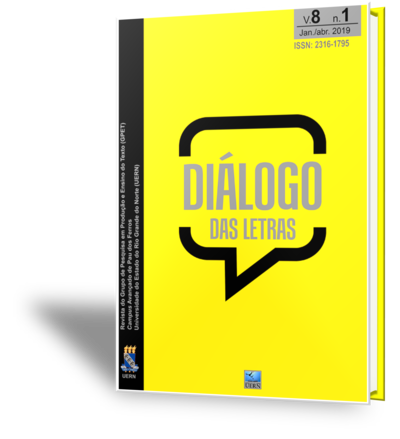EFL collaborative writing: text production and on line resources
Palavras-chave:
Collaborative writing, Digital media, English teaching and learningResumo
This paper discusses the use of digital online resources as a means to foster collaborative writing in EFL lessons. Two main online free platforms are suggested and briefly analyzed: Powtoon and Google Docs. The discussion finds theoretic support in the new literacies approach in the studies of the New London Group, Gee and Hayes (2012) and adopts a Bakhtinian orientation to language as social practice. The ideas presented are meant to be explored in EFL lessons in a variety of different learning levels and teaching contexts, ranging from basic to higher formal education as well as language schools. It is both a proposal and an exploratory study which aims at expanding the discussion concerning the processes of teaching and learning how to write in English in Brazilian formal educational contexts.
Downloads
Referências
AZZARI, E. F. O desafio de progredir na aprendizagem da língua inglesa na escola pública: dando voz aos alunos do Ensino Fundamental II. 2013. 151 p. Dissertação (Mestrado em Linguística Aplicada). Instituto de Estudos da Linguagem, Universidade Estadual de Campinas, Campinas, 2013.
AZZARI, E. F.; CUSTODIO, M. A. Fanfic, Google docs... a produção textual colaborativa. In: ROJO, R. H. (org.) Escola conectada: Os multiletramentos e as TICs. São Paulo: Parábola, 2013.
BAKHTIN, M. Problems of Dostoevsky"™s poetics. Translated by C. Emerson. Minneapolis: University of Minnesota Press, 1984.
______. The problems of Dostoevsky"™s poetics. Translated by Ann Arbor. Minnesota: Ardis, 1973.
BLACK, R. W. Access and Affiliation: The Literacy and Composition Practices of English-Language Learners in an Online Fanfiction Community. Journal of Adolescent & Adult Literacy, [s.l.], v. 49, n. 2, p.118-128, out. 2005. Wiley.
GEE, J. P. Situated language and learning: a critique of traditional schooling. London: Routledge, 2004.
GEE. J. P.; HAYES, E. R. Language and learning in the digital age. New York: Routledge, 2011.
JENKINS, H. Cultura da Convergência. São Paulo; Aleph, 2006.
JORDíO, C. M. Decolonizing identities: English for internationalization in a Brazilian university. Interfaces Brasil/Canadá, Canoas, v. 16, n. 1, 2016, p. 191-209.
LANKSHEAR, C; KNOBEL, M. A handbook for teacher research: From design to implementation. New York: Open University Press, 2004.
ROCHA, C. H. Propostas para o inglês no ensino fundamental I público: plurilinguismo, transculturalidade e multiletramentos. 2010. 243 p. Tese (Doutorado em Linguística Aplicada). Instituto de Estudos da Linguagem, Universidade Estadual de Campinas, Campinas, 2010.
SANTAELLA, L. Linguagens líquidas na era da mobilidade. 2ª ed. São Paulo: Paulus, 2011[2007].
SHIELDS, C. M. Bakhtin. New York: Peter Lang, 2007.
VILLAS BOAS, I. de F. Teaching EFL writing - a practical approach for skills-integrated contexts. São Paulo: Cengage Learning, 2017.
VITANOVA, G. Authoring the self in a no-native language: a dialogic approach to agency and subjectivity. In: HALL. J. K. et al (eds.) Dialogue with Bakhtin on Second and Foreign Language Learning. New Perspectives. New York: Routledge, 2013, p. 149-170.
Downloads
Publicado
Como Citar
Edição
Seção
Licença
A Diálogo das Letras não se responsabiliza por conceitos e opiniões emitidos pelos autores, tampouco manifesta, necessariamente, concordância com posições assumidas nos textos publicados. Além disso, os dados e a exatidão das referências citadas no trabalho são de inteira responsabilidade do(s) autor(es). Ao submeterem seus trabalhos, os autores concordam que os direitos autorais referentes a cada texto estão sendo cedidos para a revista Diálogo das Letras; ainda concordam que assumem as responsabilidades legais relativas às informações emitidas.
























